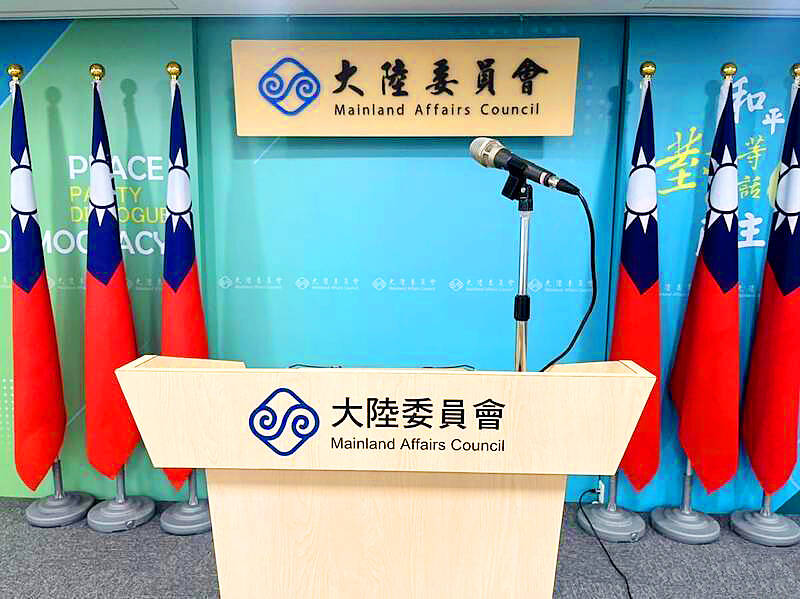The Mainland Affairs Council (MAC) yesterday vowed to investigate claims made in a YouTube video about China’s efforts to politically influence young Taiwanese and encourage them to apply for Chinese ID cards.
The council’s comments follow Saturday’s release of a video by Taiwanese rapper Chen Po-yuan (陳柏源) and YouTuber “Pa Chiung (八炯)” on China’s “united front” tactics. It is the second video on the subject the pair have released this month.
In the video, Chen visits the Taiwan Youth Entrepreneurship Park in Quanzhou in China’s Fujian Province and the Strait Herald news platform in Xiamen, China.

Photo: Taipei Times
The Strait Herald — owned by newspaper publisher Fujian Daily News, which is affiliated with the Fujian Provincial Committee of the Chinese Communist Party (CCP) — primarily focuses on issues related to Taiwan.
Strait Herald assistant director Lin Jingdong (林靖東), who is a member of the CCP, discussed in the video strategies used to influence young Taiwanese as a part of China’s “united front” tactics.
The tactics include “incubating” young Taiwanese through Taiwan-related organizations and collaborating with many small-scale influencers.
When Chen asked her about potentially running for public office, Lin said he should consider aligning with the New Party or the China Unification Promotion Party, but if he requires “organized” votes, he should align with the Chinese Nationalist Party (KMT).
Chen also spoke with the head of the entrepreneurship park, Lin Jincheng (林金城), who said that within a month Chen could apply for a Chinese ID card, register a company in China and start a cross-border e-commerce business.
With a Chinese ID card, Chen could acquire property and vehicles in China without a down payment and use them as collateral to apply for bank loans, Lin Jincheng said in the video.
Due to Taiwan’s political situation, any Taiwanese who is a “compatriot” can apply for a Chinese ID card, they said.
The video said that about 2,000 Taiwanese living in Xiamen have Chinese ID cards and 4,000 Taiwanese are applying for household registration in the city.
More than 100,000 Taiwanese already have Chinese ID cards, and the number of total applicants has reached 200,000, the video said.
The video also said that some young Taiwanese “entrepreneurs” overborrow from banks, and then split the money with intermediaries and CCP officials before transferring the rest back to Taiwan.
The MAC said that the CCP offers benefits to Taiwanese under the guise of “cross-strait exchange,” in an effort to divide the nation and undermine its stability.
Under Article 9 of the Act Governing the Relations Between the People of Taiwan and the Mainland Area (臺灣地區與大陸地區人民關係條例), “people of the Taiwan Area may not have household registrations in the Mainland Area or hold passports issued by the Mainland Area.”
Contraveners could have their Taiwanese household registration and citizenship revoked, and lose their right to participate in elections, recalls and referendums, serve in the military, and hold public office, it said.
Additional reporting by Chen Yu-fu

INVESTIGATION: The case is the latest instance of a DPP figure being implicated in an espionage network accused of allegedly leaking information to Chinese intelligence Democratic Progressive Party (DPP) member Ho Jen-chieh (何仁傑) was detained and held incommunicado yesterday on suspicion of spying for China during his tenure as assistant to then-minister of foreign affairs Joseph Wu (吳釗燮). The Taipei District Prosecutors’ Office said Ho was implicated during its investigation into alleged spying activities by former Presidential Office consultant Wu Shang-yu (吳尚雨). Prosecutors said there is reason to believe Ho breached the National Security Act (國家安全法) by leaking classified Ministry of Foreign Affairs information to Chinese intelligence. Following interrogation, prosecutors petitioned the Taipei District Court to detain Ho, citing concerns over potential collusion or tampering of evidence. The

‘FORM OF PROTEST’: The German Institute Taipei said it was ‘shocked’ to see Nazi symbolism used in connection with political aims as it condemned the incident Sung Chien-liang (宋建樑), who led efforts to recall Democratic Progressive Party (DPP) Legislator Lee Kun-cheng (李坤城), was released on bail of NT$80,000 yesterday amid an outcry over a Nazi armband he wore to questioning the night before. Sung arrived at the New Taipei City District Prosecutors’ Office for questioning in a recall petition forgery case on Tuesday night wearing a red armband bearing a swastika, carrying a copy of Adolf Hitler’s Mein Kampf and giving a Nazi salute. Sung left the building at 1:15am without the armband and apparently covering the book with a coat. This is a serious international scandal and Chinese

Seventy percent of middle and elementary schools now conduct English classes entirely in English, the Ministry of Education said, as it encourages schools nationwide to adopt this practice Minister of Education (MOE) Cheng Ying-yao (鄭英耀) is scheduled to present a report on the government’s bilingual education policy to the Legislative Yuan’s Education and Culture Committee today. The report would outline strategies aimed at expanding access to education, reducing regional disparities and improving talent cultivation. Implementation of bilingual education policies has varied across local governments, occasionally drawing public criticism. For example, some schools have required teachers of non-English subjects to pass English proficiency

TRADE: The premier pledged safeguards on ‘Made in Taiwan’ labeling, anti-dumping measures and stricter export controls to strengthen its position in trade talks Products labeled “made in Taiwan” must be genuinely made in Taiwan, Premier Cho Jung-tai (卓榮泰) said yesterday, vowing to enforce strict safeguards against “origin laundering” and initiate anti-dumping investigations to prevent China dumping its products in Taiwan. Cho made the remarks in a discussion session with representatives from industries in Kaohsiung. In response to the US government’s recent announcement of “reciprocal” tariffs on its trading partners, President William Lai (賴清德) and Cho last week began a series of consultations with industry leaders nationwide to gather feedback and address concerns. Taiwanese and US officials held a videoconference on Friday evening to discuss the